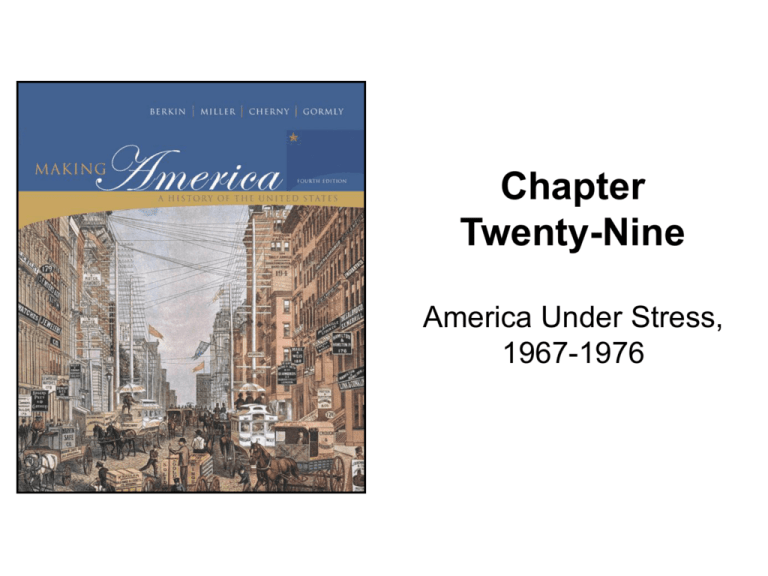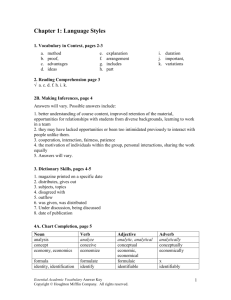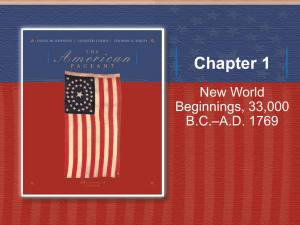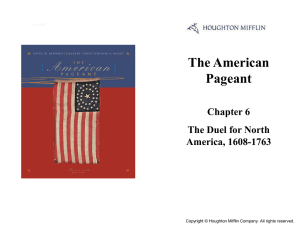
Chapter
Twenty-Nine
America Under Stress,
1967-1976
Berkin, Making America
Chapter 29
The United States intervened
militarily in the Dominican Republic in
the mid-1960s
1. when the government there seized all property
owned by Americans.
2. because President Johnson wanted to resurrect
the Roosevelt Corollary to the Monroe Doctrine.
3. to prevent further inroads by communism.
4. to prevent the Soviet Union from establishing
another missile base in the Caribbean.
Copyright © Houghton Mifflin Company. All rights reserved.
29-2
Berkin, Making America
Chapter 29
The United States intervened
militarily in the Dominican Republic in
the mid-1960s
3. to prevent further inroads by communism.
Hint: The United States viewed the rebelling forces
there as adherents of communism, and hence of
Castro. See page 934.
Copyright © Houghton Mifflin Company. All rights reserved.
29-3
Berkin, Making America
Chapter 29
The Tet Offensive can be best
described as
1. an unqualified military victory for North Vietnam.
2. undermining support within the United States for
the war in Vietnam.
3. the occasion when China and the Soviet Union
intervened militarily in support of North Vietnam.
4. the reason that the Johnson administration
decided to escalate America’s involvement in
Southeast Asia.
Copyright © Houghton Mifflin Company. All rights reserved.
29-4
Berkin, Making America
Chapter 29
The Tet Offensive can be best
described as
2. undermining support within the United States for
the war in Vietnam.
Hint: American public opinion shifted strongly
against the war in Vietnam. See pages 937–938.
Copyright © Houghton Mifflin Company. All rights reserved.
29-5
Berkin, Making America
Chapter 29
According to the terms of the Gulf of
Tonkin Resolution,
1. Congress gave President Johnson unlimited
authority to increase America’s military
involvement in Vietnam.
2. the United States declared that it would go to war
with China in order to prevent a communist
victory in Vietnam.
3. the United Nations declared that America must
leave Vietnam or face condemnation by the world
body.
4. South Vietnam was told to assume all
responsibility for its own defense.
Copyright © Houghton Mifflin Company. All rights reserved.
29-6
Berkin, Making America
Chapter 29
According to the terms of the Gulf of
Tonkin Resolution,
1. Congress gave President Johnson unlimited
authority to increase America’s military
involvement in Vietnam.
Hint: See pages 934–936.
Copyright © Houghton Mifflin Company. All rights reserved.
29-7
Berkin, Making America
Chapter 29
The war in Vietnam differed from
World War II because
1. the Republican Party opposed America’s
participation in the Vietnam conflict.
2. during the 1960s, isolationist sentiment once
again became widespread and influenced foreign
policy.
3. a vocal antiwar movement during the Vietnam
conflict decisively affected domestic politics.
4. America provided only backup support to its ally in
Vietnam.
Copyright © Houghton Mifflin Company. All rights reserved.
29-8
Berkin, Making America
Chapter 29
The war in Vietnam differed from
World War II because
3. a vocal antiwar movement during the Vietnam
conflict decisively affected domestic politics.
Hint: See pages 937–939.
Copyright © Houghton Mifflin Company. All rights reserved.
29-9
Berkin, Making America
Chapter 29
The combined 57 percent of the vote
won by Richard Nixon and George
Wallace in the 1968 presidential
election indicated that a majority of the
electorate
1. supported conservative social principles.
2. favored more civil rights legislation.
3. believed that Hubert Humphrey was intellectually
incapable of serving as president.
4. wanted an immediate American withdrawal from
Vietnam.
Copyright © Houghton Mifflin Company. All rights reserved.
29-10
Berkin, Making America
Chapter 29
The combined 57 percent of the vote
won by Richard Nixon and George
Wallace in the 1968 presidential
election indicated that a majority of
the electorate
1. supported conservative social principles.
Hint: Wallace opposed the antiwar movement and
civil rights legislation. Nixon appealed to
conservatives by attacking lawlessness and
permissive personal behavior. See page 941.
Copyright © Houghton Mifflin Company. All rights reserved.
29-11
Berkin, Making America
Chapter 29
Gerald Ford incurred wide
disapproval when he
1. tried to reinvolve the United States in Vietnam.
2. fired Henry Kissinger.
3. pardoned Richard Nixon.
4. pardoned Spiro Agnew.
Copyright © Houghton Mifflin Company. All rights reserved.
29-12
Berkin, Making America
Chapter 29
Gerald Ford incurred wide
disapproval when he
3. pardoned Richard Nixon.
Hint: See pages 952–953.
Copyright © Houghton Mifflin Company. All rights reserved.
29-13
Berkin, Making America
Chapter 29
According to the New Right, the
Warren Supreme Court
1. handed down decisions that favored the criminal.
2. was far too restrictive when it came to individual
liberties.
3. had not gone far enough in its decision ordering
school desegregation.
4. was the best hope at the federal level for
countering liberalism.
Copyright © Houghton Mifflin Company. All rights reserved.
29-14
Berkin, Making America
Chapter 29
According to the New Right, the
Warren Supreme Court
1. handed down decisions that favored the criminal.
Hint: The Court’s decisions in fact expanded and
protected the rights of accused individuals. See
page 928.
Copyright © Houghton Mifflin Company. All rights reserved.
29-15
Berkin, Making America
Chapter 29
The term Chicano refers to Mexican
Americans who
1. feared challenging the status quo in many
southwestern states.
2. sought greater rights and recognition of their
heritage.
3. opposed both Democrats and Republicans and
formed their own political party.
4. began a mass migration back to Mexico during
the 1960s.
Copyright © Houghton Mifflin Company. All rights reserved.
29-16
Berkin, Making America
Chapter 29
The term Chicano refers to Mexican
Americans who
2. sought greater rights and recognition of their
heritage.
Hint: See page 929.
Copyright © Houghton Mifflin Company. All rights reserved.
29-17
Berkin, Making America
Chapter 29
The Nixon administration’s policy of
Vietnamization
1. required that the United States first establish
diplomatic ties with communist China.
2. was rejected by the government of South
Vietnam.
3. prevented the North Vietnamese from seizing
control of South Vietnam.
4. phased out America’s military involvement in
Vietnam.
Copyright © Houghton Mifflin Company. All rights reserved.
29-18
Berkin, Making America
Chapter 29
The Nixon administration’s policy of
Vietnamization
4. phased out America’s military involvement in
Vietnam.
Hint: Under Nixon’s plan, the United States gradually
reduced its involvement in South Vietnam. See
pages 942–946.
Copyright © Houghton Mifflin Company. All rights reserved.
29-19
Berkin, Making America
Chapter 29
As part of the policy of détente, the
United States
1. established ties with communist China.
2. embarked on a massive military buildup.
3. declared that the Cold War was over.
4. heavily bombed North Vietnam.
Copyright © Houghton Mifflin Company. All rights reserved.
29-20
Berkin, Making America
Chapter 29
As part of the policy of détente, the
United States
1. established ties with communist China.
Hint: Relations with China proved to be the
cornerstone of the policy. See pages 946–947.
Copyright © Houghton Mifflin Company. All rights reserved.
29-21



